“So what do the creeks mean to you, Johnny?”
The documentary producer asked me this question while we were standing on the banks of Big Creek in Newton County, Arkansas, while videoing a segment for his upcoming documentary. The documentary is about a hog farm that’s set up shop near the banks of Big Creek, and Big Creek is a tributary of the Buffalo National River. I won’t give any spoilers here, but the documentary focuses on this farm’s impact on the waters and also its impact on the people of the region. It’s a polarizing subject here in Arkansas.
Even though I knew my personal perspective on the happenings alongside Big Creek were going to be central to the documentary, I was unprepared for how much weight this question carried. Though the producer said my answers were fine, I didn’t agree. They were shallow and cliche. I wasn’t sure if I could even put those feelings into words. The question haunted me.
What do the creeks mean to me?
On the drive home, I thought about this question as I guided my truck down a dirt road and through switchbacks leading down to Hurricane Creek or “Herrican” as it’s known to the locals and those of local ancestry. At the end of a hidden side road barely big enough for my truck there sits a hole of water known to all that whisper of its existence simply as “the swimming hole.” This is where my dad learned to swim. I caught my first ever smallmouth in the riffle running out of this pool. There’s a boulder in the middle that’s perfect for jumping into clear and summertime cool water. The swimming hole has a campground that’s been used by folks all the way from the roots in my family tree on to the outer branches. The camping area is on a jut of privately owned land surrounded by public, but the land owner doesn’t mind sharing. Most every camper that settles in here for a night or two leaves the place just like they found it. My uncle says it’s been this way, the pool and the camping area, for as long as he can remember.
More Like This
I took a fishing day-trip to the hills last July and found the swimming hole delightfully deserted after a morning of bronze bass action downstream. The pool shimmered under a noon sun as copper shallows plunged into aquamarine depths at the boulder’s base. A small school of smallmouth patrolled the pool’s perimeter. Longear sunfish positioned themselves near the shoal waiting on hapless crayfish lost in the current. I shucked sweaty clothes and waded in up to my neck, wonderfully lost to the world of cellphones and traffic in this lonesome hollow. Immersion is the word but the word does not nearly capture the experience.
What do the creeks mean to me?
A few days later, I thought about that question again while standing on the banks of another Ozark creek. The cold winter waters of the Illinois Bayou foamed white with subversive energy at a rocky shoal before plunging and transforming into the brilliant cyan of a deep pool. The pool’s depth gave it an illusion of stoicism. Room to stretch does that to moving water. The pool seemed unmoving and unchanging, forever enduring with the dark rippling of quiet power at rest. But beneath the gentle surface, that fierce energy churned onward forever altering the channel with minute bites and subtle nudges.

Right here, at this very spot, the Bayou’s course has changed dramatically just over the span of my lifetime. The main channel has moved at least 200 feet and the water has dissolved the four-foot shale overhangs that once provided some fantastic inner-tube rides. It was just below those rapids, on a tiny island, that my family would camp after hauling coolers, sleeping bags, lanterns and whatever else we needed up the creek in a rubber raft. On summer day-trips the raft’s cargo often included my grandmother. We would ride the inner-tubes and jump from a nearby bluff. We would chug Pepsi while scarfing down cold sandwiches and chips. We fed bread crumbs to swarming schools of minnows.
As the summer sun gave up it’s relentless rule and sank below the hills, ringed dimples and v-shaped slashes punctuated by mini explosions in the water signaled that my favorite time of day was here. As everyone else prowled the banks for firewood, I flung cast after cast toward the dimples and slashes.
What do the creeks mean to me?
The better question is: What am I without the creeks? What am I without the memories and heritage of these sacred waters? What am I but a man shaped by heritage and memories? Just as the deer and squirrels of this land have nourished my body so have the waters nourished my soul. These are my holy places and, really, there are no words to capture an answer for either question.

What am I without the creeks?
I am not me.
The waters of Illinois Bayou darken as another winter day draws to a close. I dip my hand into the creek and feel the tingling chill, the wild and raw energy, the essence of this place that I call home. I feel the creek surging through my fingers.
I feel the creek surging through my veins.

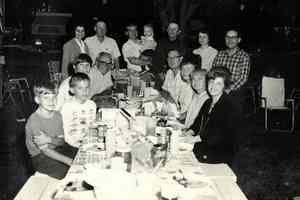

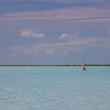
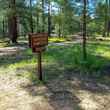
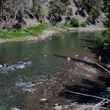
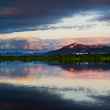
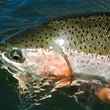



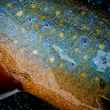
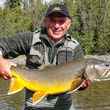


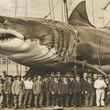
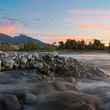
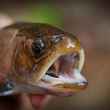




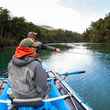



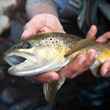

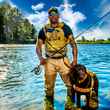
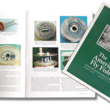
Comments
Ross Slayton replied on Permalink
Creeping softly up the flow
Dark shadows darting to and fro
3 wt readied, elk hair dry
Cast, sit still, eyes glued to the fly
Dimpled snout, poking up mirrored slick
Rod tip raised on hook points prick
Short frantic fight giggles of glee
Small trout to hand then let, to be free.
Tobin replied on Permalink
Very well put. When we lose things like creeks, rivers, wildernness and landscapes, we lose ourselves.
Pages